Vietnam - A responsible partner of the international community
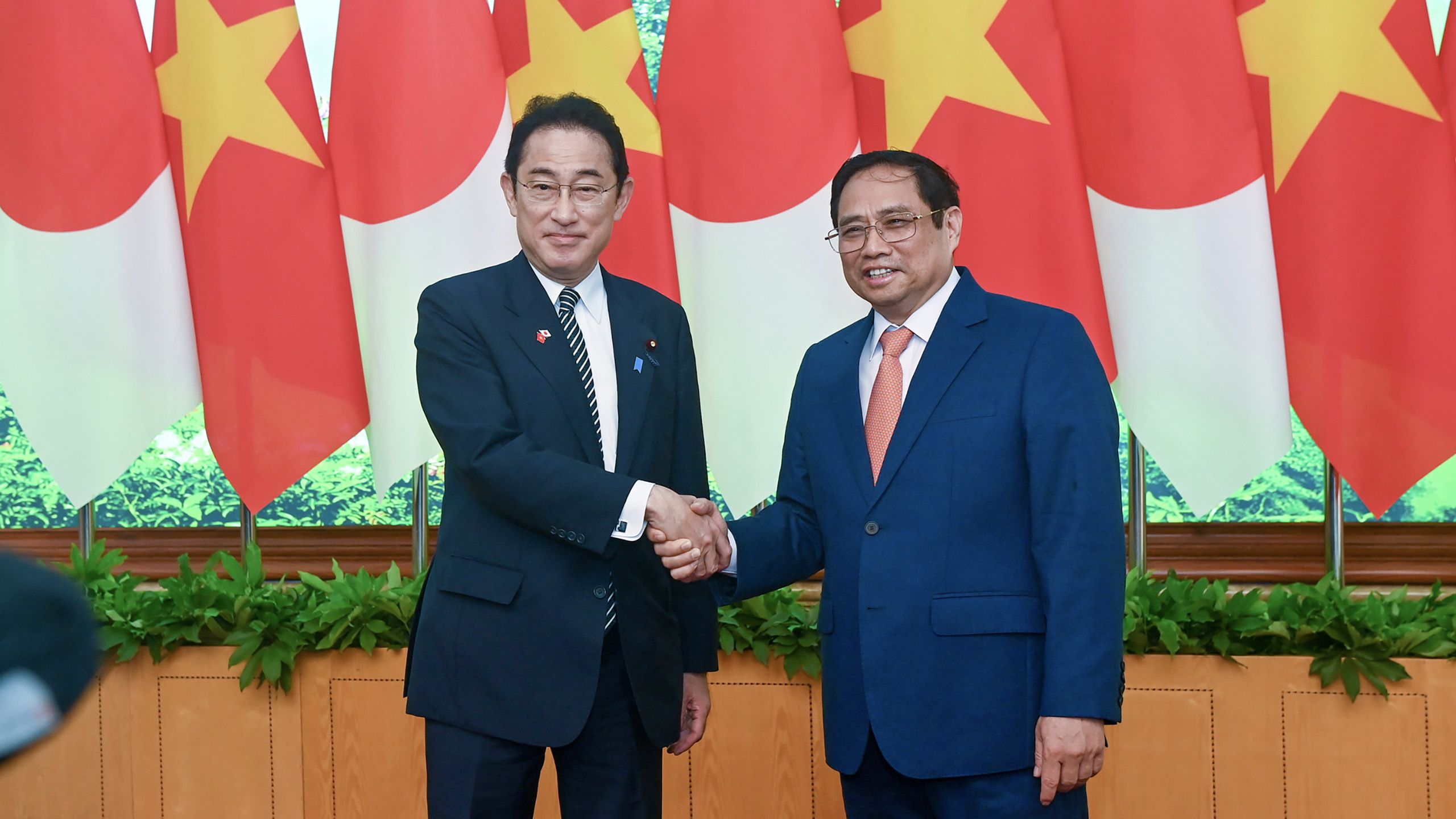
At the invitation of Japanese Prime Minister Kishida Fumio, Vietnamese Prime Minister Pham Minh Chinh and a high-ranking Vietnamese delegation will attend the expanded G7 Summit and work in Japan from May 19 to 21, 2023. The working trip takes place in the context that Vietnam and Japan maintain high political trust and attach importance to advancing their extensive strategic partnership to grow stronger, more comprehensive and more substantive.
This is the third time Vietnam has been invited to a G7 Summit, and the second time as an independent guest, without being the chair of a cooperation mechanism or the representative of a regional group. This also marks the second time that Japan has invited Vietnam to a G7 Summit, demonstrating the high regard and appreciation that Japan and the G7 have for Vietnam's position, role and contribution in addressing regional and global issues.
Vietnam-Japan: Sincerity and trust
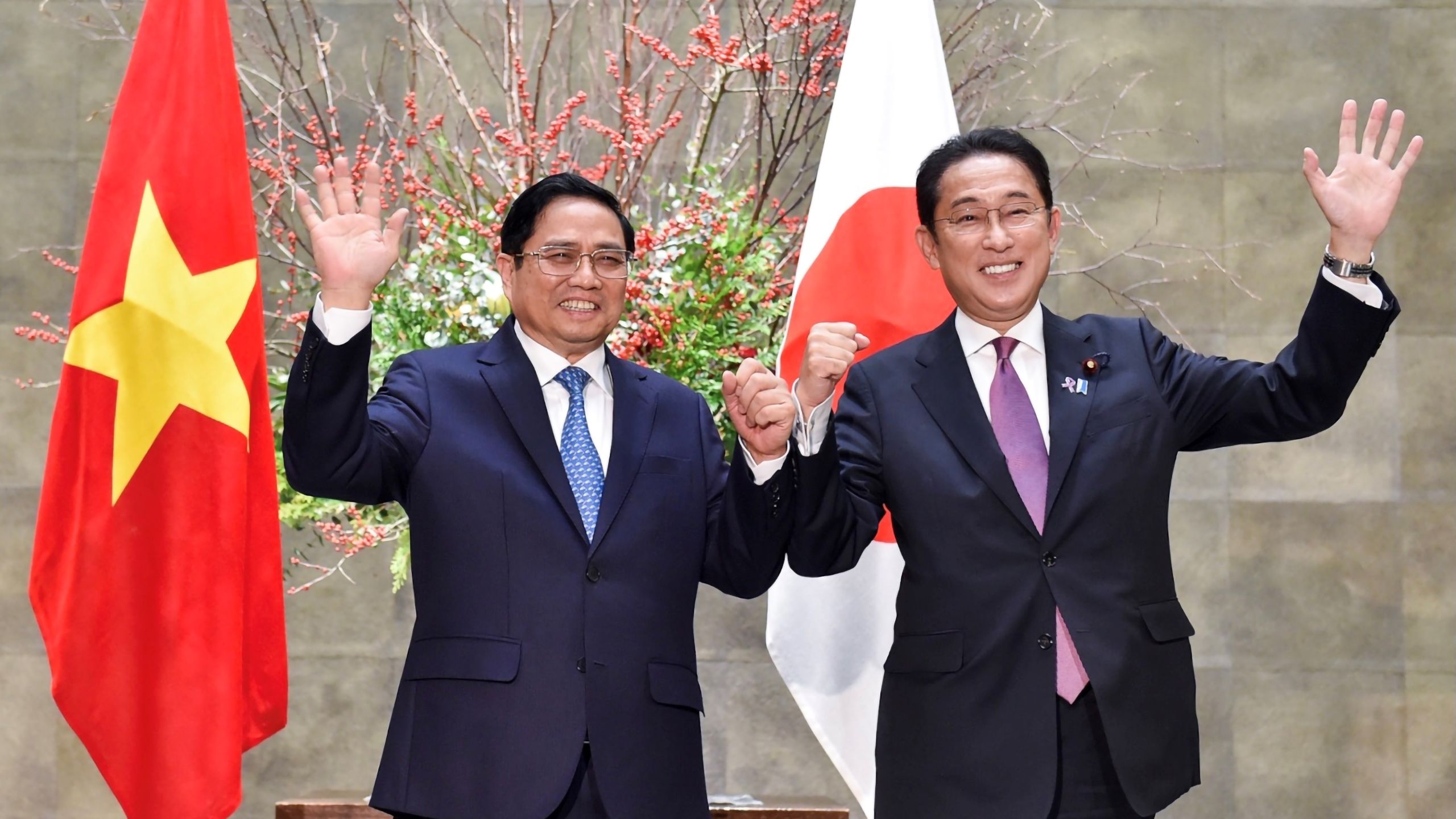
Japanese Prime Minister Kishida Fumio welcomes Prime Minister Pham Minh Chinh on his official visit to Japan in November 2021. (Photo: Baoquocte.vn)
Japanese Prime Minister Kishida Fumio welcomes Prime Minister Pham Minh Chinh on his official visit to Japan in November 2021. (Photo: Baoquocte.vn)
Despite the many changes and challenges in the world and regional situation over the past half a century, the friendship and cooperation between Vietnam and Japan have reached their highest level of development since the establishment of diplomatic relations in 1973, with a strong foundation of political trust. Senior leaders of the two countries have maintained regular visits and exchanges at international and regional forums, including 12 visits by Japanese Prime Ministers to Vietnam and 20 visits by Vietnamese Prime Ministers to Japan.
Based on a shared strategic vision on the potential for cooperation and the future of their relations, Vietnam and Japan have continuously witnessed rapid and substantive development in their extensive strategic partnership across all areas, including economics, politics, diplomacy, security, and defence, with a spirit of mutual understanding and respect and mutually beneficial cooperation.
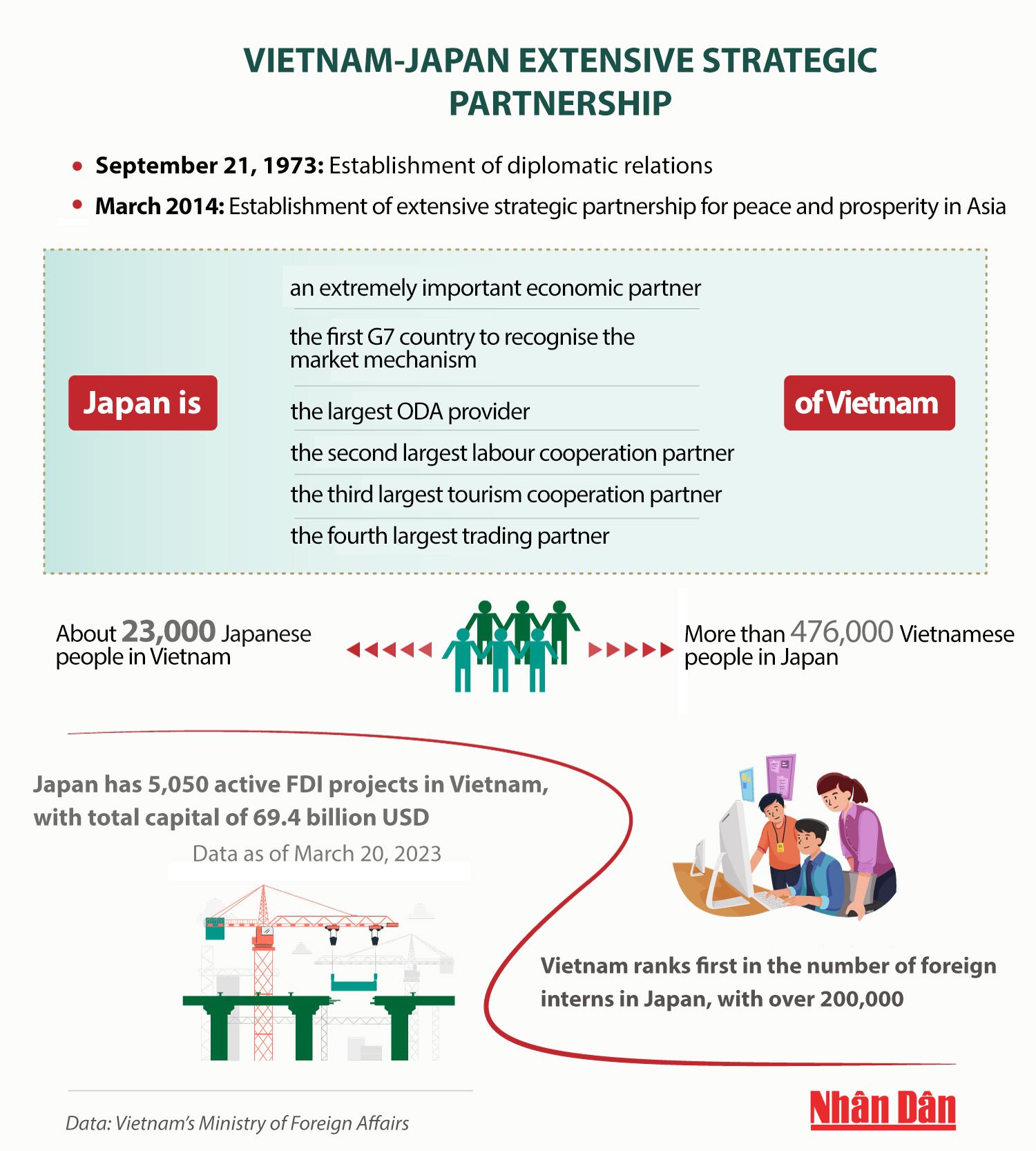
The two countries have built many important legal frameworks for bilateral relations, such as the Vietnam-Japan Cooperation Committee co-chaired by two Foreign Ministers (since 2007); the Vietnam-Japan Strategic Partnership Dialogue on Diplomacy-Security-Defence at the deputy ministerial level (since 2010); the Vietnam-Japan Defence Policy Dialogue at the deputy ministerial level (from November 2012); the Security Dialogue at the deputy ministerial level (since November 2013); the Joint Commission on Trade, Energy and Industry (since 2014); the Agriculture Dialogue at the ministerial level (since 2014); and the Vietnam-Japan Maritime Policy Dialogue at the ministerial level (established in December 2019).
Vietnam and Japan are both members of new-generation free trade agreements and have promoted economic linkages and trade liberalisation through the signing and implementation of the Comprehensive and Progressive Agreement for Trans-Pacific Partnership (CPTPP) and the Regional Comprehensive Economic Partnership (RCEP).
Japan highly valued the role and constructive contributions to solving international and regional issues and affirmed Vietnam’s importance in Japan's foreign policy in the Indo-Pacific region. Vietnam affirmed Japan's role as its important and long-term partner and expressed its wish for Japan to continue playing an active and constructive role in international and regional issues.

As two East Asian countries and two maritime nations, the two economies of Vietnam and Japan are highly complementary with plenty of room and potential for cooperation in many fields, especially in technological innovation, digital transformation, supply chain diversification, and green development.
- Prime Minister Pham Minh Chinh
After 50 years of establishing their diplomatic relations, the economic cooperation between Vietnam and Japan has developed rapidly and comprehensively. Currently, Japan is the largest ODA donor, the second labour cooperation partner, the third investor, the third tourism partner, and the fourth largest trade partner of Vietnam.
Japan currently has more than 5,000 valid projects with a total investment of nearly 70 billion USD, ranking third among the 143 countries and territories conducting investment projects in Vietnam. In the first three months of this year, the import-export turnover of the two countries reached more than 10 billion USD. with Vietnam's exports to Japan and Vietnam's imports from Japan both having reached more than 5 billion USD.
The relationship between the localities from the two countries is also a bright spot with more than 70 couples of localities having cooperation agreements, such as Ho Chi Minh City with Osaka (2007) and Nagano (2017), Hanoi with Fukuoka (2008) and Tokyo (2013), Da Nang with Sakai (2009) and Yokohama (2013), Hue with Kyoto (2014), Hai Phong with Niigata (2015), etc.
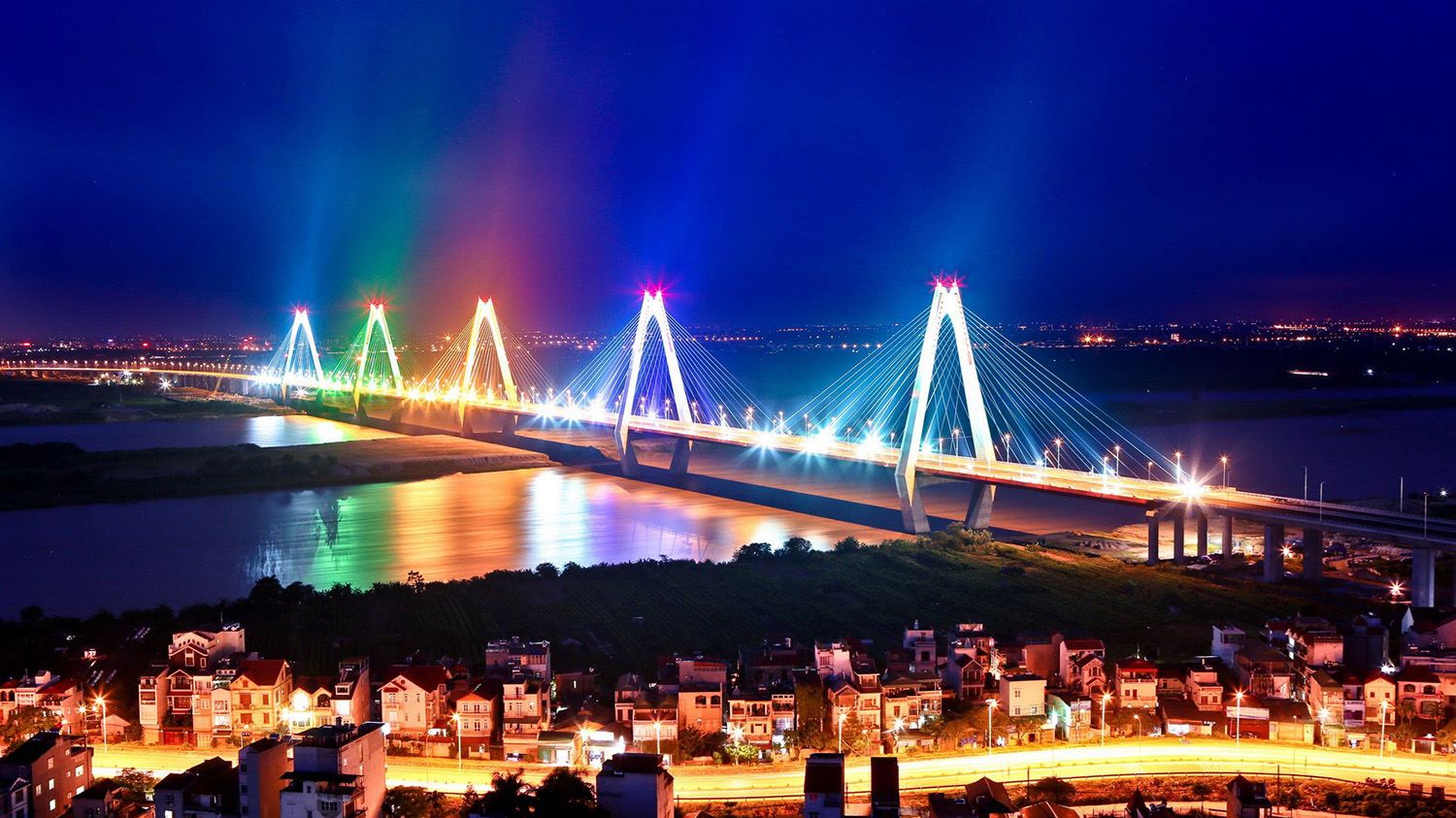
Nhat Tan Bridge - one of the key projects built by Japan's ODA capital. (Photo: VNA)
Nhat Tan Bridge - one of the key projects built by Japan's ODA capital. (Photo: VNA)
People-to-people exchange has developed strongly and deeply, contributing to enhancing the mutual understanding and friendship between the two peoples. The total number of Vietnamese people living, working, and studying in Japan is over 470,000, making them the second largest expat community in the country of the rising sun. They have been actively contributing to the socio-economic development of Japan and are an important friendship bridge for the two countries' relations. Vietnamese people currently live, work, and study in 47 provinces and cities directly under the Central Government of Japan.
Japan is also Vietnam's leading ODA provider with more than 27 billion USD in loans, making an important contribution to the development of large-scale infrastructure projects. Japan has supported Vietnam in technology transfer and human resource training, thereby creating a driving force for sustainable socio-economic development in Vietnam. These are important achievements, contributing to cementing the economic, trade, and investment cooperation between Vietnam and Japan in the spirit of mutual benefit and complementarity.
Cooperation in education and training between the two countries has developed in many forms, with Japan being one of the largest non-refundable aid countries for the education and training sector in Vietnam. The most prominent cooperation programmes that bring Vietnamese trainees to Japan are those with Japan International Training Cooperation Organization or with the Japan Society of Human Resource Management.
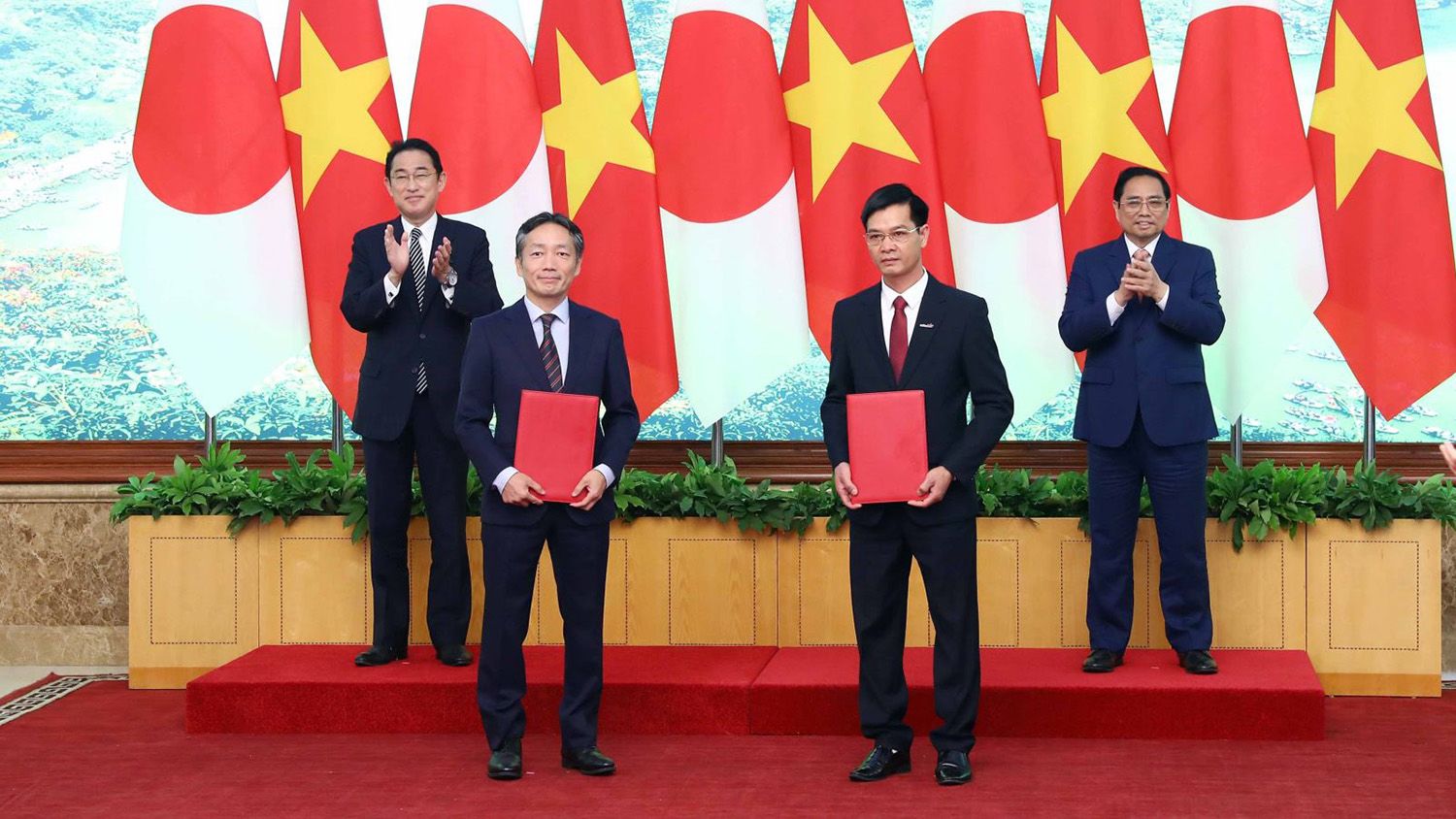
The Prime Ministers of the two countries Vietnam and Japan witnessed the signing of a memorandum of understanding between the Technical College of Technology and Thang Long Industrial Park Co., Ltd. on training and developing highly skilled human resources, May 1, 2022, in Hanoi. (Photo: General Department of Vocational Education)
The Prime Ministers of the two countries Vietnam and Japan witnessed the signing of a memorandum of understanding between the Technical College of Technology and Thang Long Industrial Park Co., Ltd. on training and developing highly skilled human resources, May 1, 2022, in Hanoi. (Photo: General Department of Vocational Education)
Vietnam ranks first in the number of foreign trainees in Japan, with more than 200,000 people. In 2022, Japan is the leading labour market, receiving the most Vietnamese human resources with more than 67,000 people. Vietnam is providing a lot of highly skilled technical workers, information technology engineers, or implementing programmers to bring nurses and midwives to work in Japan, especially in the context that there is still a shortage of many workers in the nursing and midwifery sector in Japan.
Japan has continued to pay attention to and promote cooperation between the two countries in various fields, especially in supporting Vietnam to promote industrialisation, modernisation, and deep international integration; and supporting Vietnam in developing strategic infrastructure, digital transformation, green transformation, digital economy, energy transformation, etc.

Japan has attached special importance to relations with Vietnam and highly appreciates the socio-economic development achievements, position, and increasingly important role of Vietnam in the region and in the world.
- Japanese Prime Minister Kishida Fumio
The year 2023 marks an important milestone in Vietnam-Japan relations. The two countries' senior leaders agreed to maintain close coordination, promote dialogue mechanisms, enhance exchanges and contacts at all levels, and organise meaningful activities on the occasion of the 50th anniversary of the establishment of the diplomatic relations between the two countries, such as the implementation of the Vietnam-Japan University project and strengthening cooperation in multilateral frameworks, including the United Nations, ASEAN, and the Mekong.
Japan is actively implementing international initiatives and diplomatic activities, security, defence and economic cooperation in the region and the world, notably hosting the G7 Summit and hosting the Expanded G7 Summit in Hiroshima City.
The goal of peace, stability, prosperity
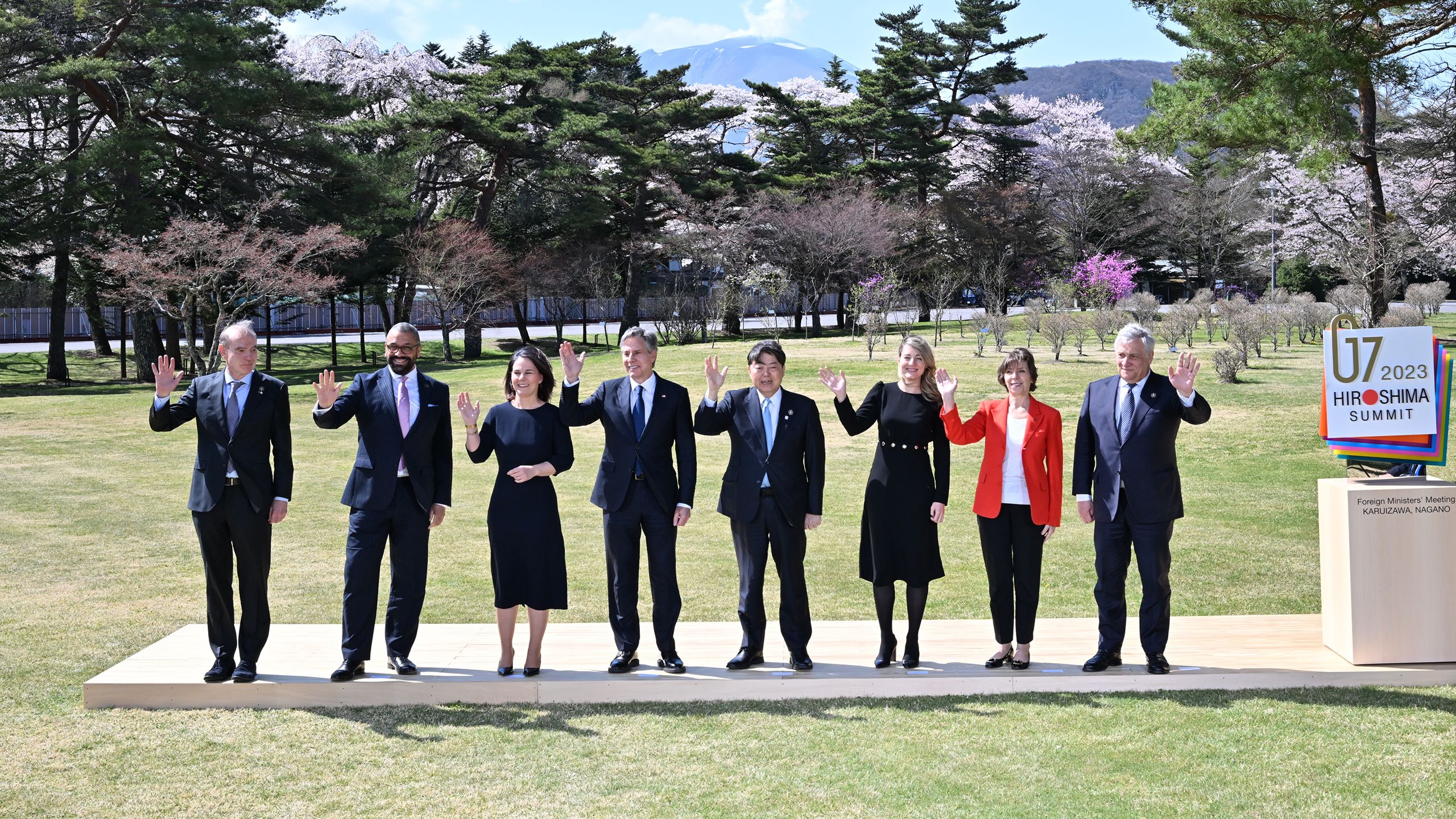
G7 foreign ministers pose for a photo together at the meeting in Karuizawa Town, Nagano Prefecture, Japan, April 18, 2023. (Photo: g7hiroshima)
G7 foreign ministers pose for a photo together at the meeting in Karuizawa Town, Nagano Prefecture, Japan, April 18, 2023. (Photo: g7hiroshima)
Founded in 1976, the Group of Leading Industrialised Countries (G7 or Group of Seven) is an alliance, comprising seven economies: Japan, the UK, Germany, France, Italy, the US, and Canada.
Playing an important role in shaping and strengthening global structure and governance with the Group of the world’s major developed and emerging economies (G20), the G7 is a gathering of voices, reflecting the views of similarities and interests of developed countries in addressing common issues of international security and fostering discussions to address global challenges.
This year's 49th G7 Summit took place in the context that the world's political, economic and security situation continues to be complicated and unpredictable, affecting many aspects of the security environment and common development. Especially with major countries intensifying their strategic competition, the world economy's recovery is slowing down and facing many risks and challenges, such as the risk of inflation, instability in the financial and banking systems; along with non-traditional security challenges such as natural disasters, epidemics, and climate change.
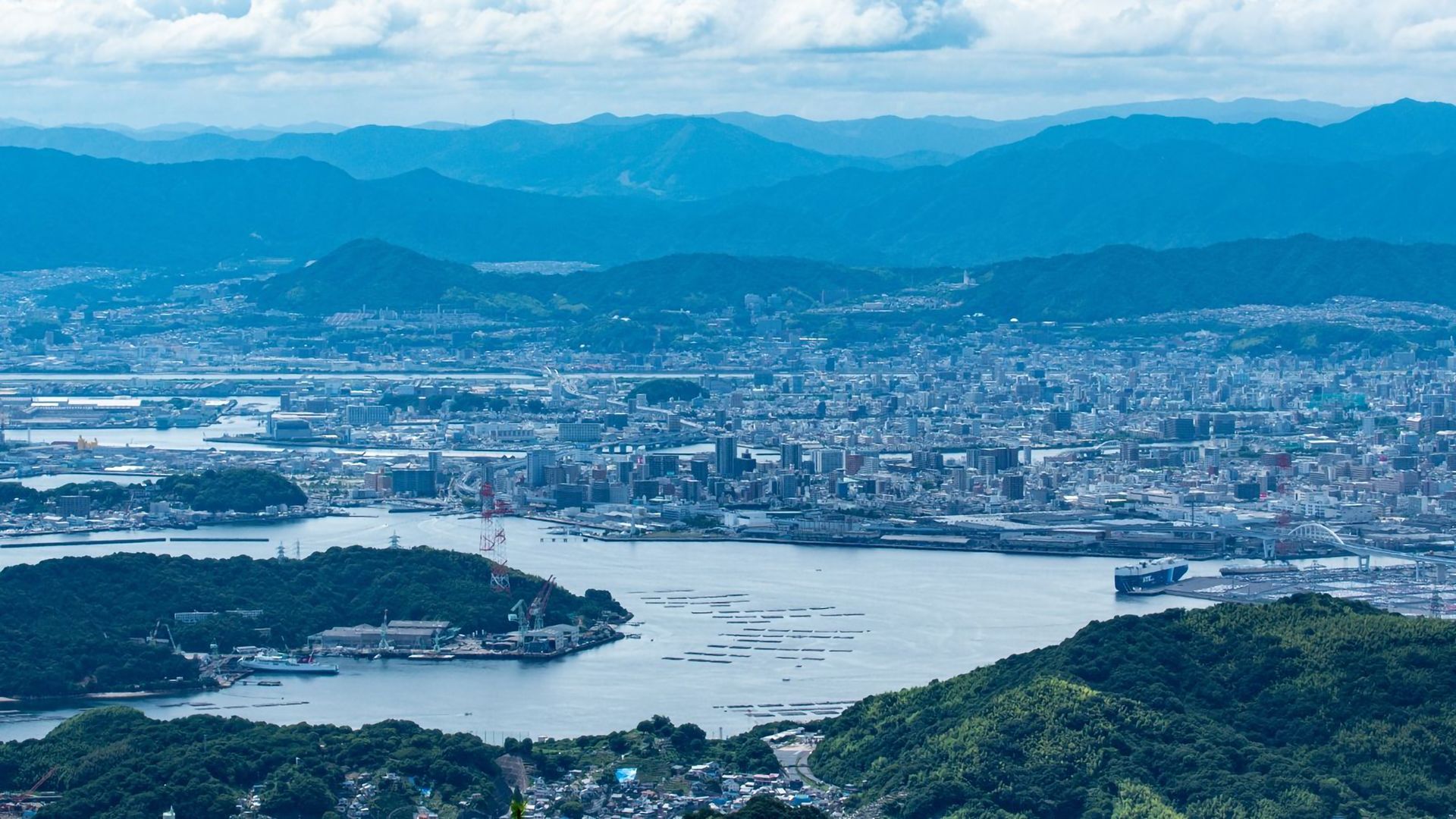
Hiroshima City, Japan - where the G7 Summit and the G7 Expanded Summit in 2023 take place. (Photo: g7hiroshima)
Hiroshima City, Japan - where the G7 Summit and the G7 Expanded Summit in 2023 take place. (Photo: g7hiroshima)
In addition to the Summit, the G7 has an Annual Meeting mechanism between Finance Ministers, Minister of Foreign Affairs and Central Bank Governors. Ministers in charge of other areas, such as environment, energy, labour, and agriculture, may meet depending on the agenda and priorities of the chairman country.
The G7 Expanded Summit was held within the framework of the G7 Summit, with the participation of invited countries and international organisations. The first G7 Expanded Summit was held in 2000 with the participation of South Africa as the first guest. The G7 Expanded Summit aims to strongly promote the participation and contribution of developing countries, as well as to strengthen the G7's partnership with developing countries in addressing global challenges.
This year's G7 Expanded Summit will discuss three topics, including: Working to address multiple crises (with themes of food, health, development, gender equality), Joint efforts for a sustainable planet (with themes of climate, environment, and energy), and moving towards a peaceful, stable, and prosperous world (with themes of peace, respect for international law, multilateral cooperation).
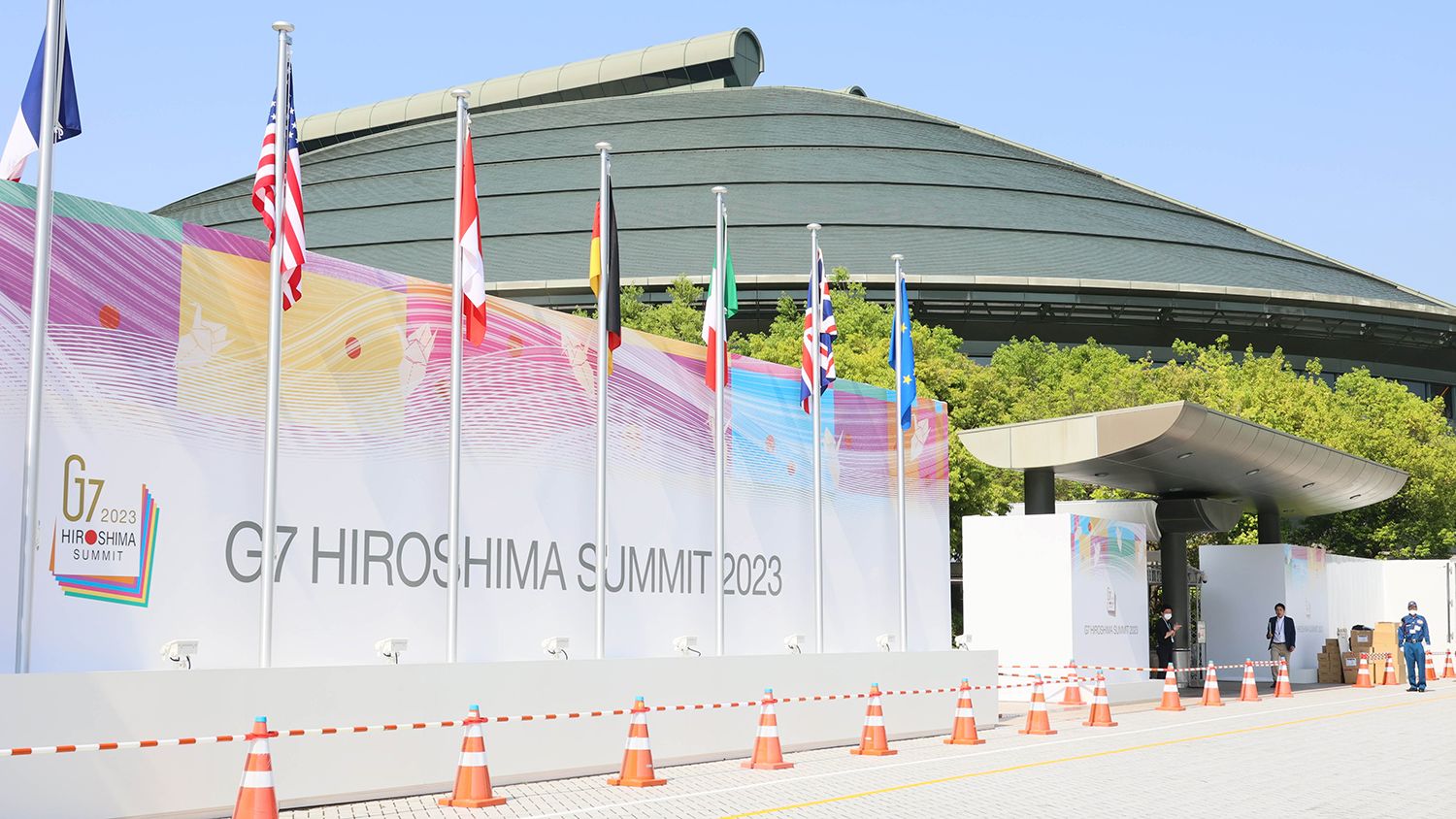
Outside the venue for the G7 Summit 2023. (Photo: g7hiroshima)
Outside the venue for the G7 Summit 2023. (Photo: g7hiroshima)
This is the third time Vietnamese leaders have attended, after Ise-Shima, Japan, in May 2016 and Quebec, Canada, in June 2018. It is also the second time Vietnam has been invited as a single nation, not in its capacity as a representative of an organisation or a group of countries in the region.
This shows the importance of Vietnam's position and role in the region to Japan, the G7 Chairman in 2023, and the G7 in general. Japan's second invitation to Vietnam to attend the G7 Expanded Summit is a testament to the political reliability between the two countries, affirming Vietnam's initiative and responsibility in addressing global challenges, in accordance with the interests of the two peoples as well as peace and prosperity in Asia and in the world. The G7 and its member countries attach great importance to relations with Vietnam, wish to strengthen multifaceted and mutually beneficial cooperation with Vietnam, considering Vietnam as a bridge for cooperation with ASEAN and the region.
Japan is the first G7 member country to:
- Welcome the General Secretary of Vietnam (1995)
- Establish a strategic partnership with Vietnam (2009)
- Recognise Vietnam's market economy regulations (2011)
- Invite Vietnam to attend the G7 Summit (2016)
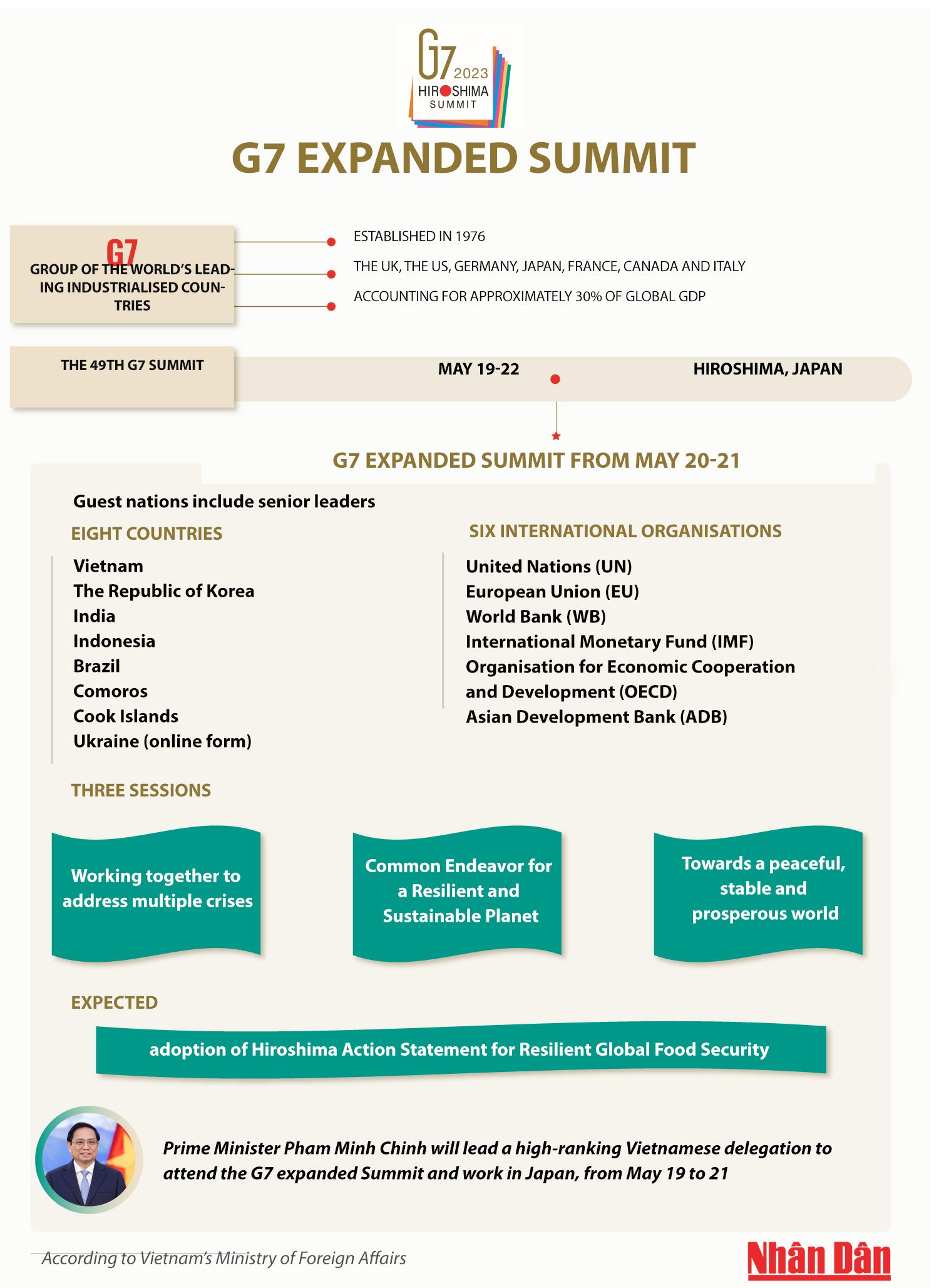
The G7 expanded Summit is also an opportunity for Vietnam to implement the foreign policy of the 13th Party Congress of independence, self-reliance, peace and development, as well as multilateralism and diversifying foreign relations, thereby conveying the message of a developed dynamic and innovative Vietnam. The country also delivers a message of building an independent and self-reliant economy associated with extensive, effective and active international integration, with a sense of responsibility, contributing to solving problems of the region and the international community for peace, development and common prosperity.
The guest countries at the G7 expanded Summit in 2023 are either located in the Southern Hemisphere or are important partners of Tokyo. In particular, Southeast Asia is the only region where two countries are invited to attend, including Vietnam and Indonesia, the ASEAN Chair in 2023. Vietnam’s participation affirms its role, position and contribution to the joint efforts to promote cooperation, maintain economic growth and address common challenges of the international community.

Apart from Vietnam, only Brazil, the Republic of Korea and Australia are invited to attend this G7 expanded Summit, although they are not the Chair of a forum or a cooperation mechanism in the region and the world.
- Japanese Ambassador to Vietnam Yamada Takio
The 49th G7 Summit in Hiroshima will focus on emerging issues, including food, health, development, gender equality, climate change response, environment, energy, and others. The G7 expanded Summit is expected to adopt the Hiroshima Action Statement for Resilient Global Food Security. In particular, this will be the first time that the G7 expanded Summit adopts a joint statement.
Vietnam and Japan continue to cooperate closely and effectively at multilateral forums, and actively participate in joint efforts to deal with emerging challenges and threats, contributing to maintaining international peace and security. Vietnam supports Japan and hopes that the country will promote its role and make substantial and active contributions to the region and the world, as it assumes the two roles of a non-permanent member of the United Nations Security Council, in the 2023-2024 term and the G7 Chair in 2023.
Published: May 2023
Production Manager: CHU HONG THANG - PHAM TRUONG SON
Content: NINH SON - HONG DUY
Design: HOANG HA, QUANG VINH
Translation: NDO